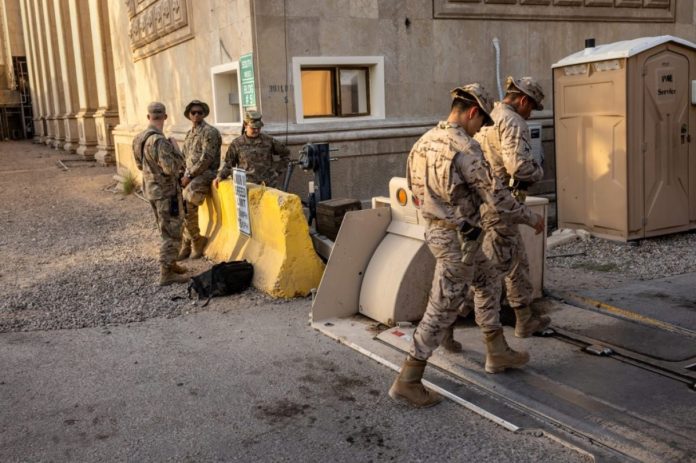The recent escalation of tensions between the United States and Iraq has sparked a debate over the future of American military presence in the region. With Washington’s approval in the Middle East at an all-time low due to various factors, including its involvement in conflicts like the proxy war in Ukraine and its prolonged presence in Iraq, the question of whether the US should maintain its military presence in the country has become increasingly pressing.
The recent attack on a US military base, known as “Tower 22”, located in northern Jordan, marked a significant blow to American forces. This attack, which resulted in the loss of American service personnel, was just one in a series of over 150 attacks on US-stationed positions stretching from Iraq to Syria and now Jordan. In response, some hawks on Capitol Hill have called for direct retaliation against Iran, suggesting striking targets inside the country.
President Joe Biden has expressed a commitment to fighting terrorism and holding those responsible for the attacks to account. However, he has also emphasized that the US does not seek a full-scale war with Iran. This delicate balance reflects the challenges faced by the Biden administration in navigating the complex dynamics of the region, particularly during an election year where foreign policy decisions could have significant political implications.
But some hawks on Capitol Hill are calling for blood by suggesting hitting Iran directly as an appropriate form of retaliation. Senator Lindsey Graham (R-SC) said in a statement on X that previous US retaliations on Iranian proxies were insufficient and “will not deter Iranian aggression”. He advocated “striking targets of significance inside Iran”.
Iraqi Prime Minister Mohammad Shia al-Sudani has called for a “quick and orderly negotiated exit” of US-led coalition forces from the country. Sudani argues that the presence of the remaining 2,500 troops is destabilizing and that their continued placement in Iraq is causing more trouble than they are worth. While the Iraqi government has the legal right to request the withdrawal of foreign forces, it has not yet set a clear deadline for their departure.
The prospect of a US withdrawal from Iraq raises concerns about the potential consequences for regional stability and the balance of power in the Middle East. Iran, which has long sought to evict the United States from the region, would likely view such a withdrawal as a major victory. However, some experts caution against a hasty withdrawal, suggesting that Washington may want to consider other options before making a final decision.
Joshua Landis, a Middle East scholar and professor, believes that the Biden administration will try to remain in Iraq with minor alterations to its agreement with the Iraqi government. Landis suggests that the eighty-one-year-old Joe Biden is unlikely to withdraw troops before the November elections, as the US President is struggling to keep his approval rating up – as it is hovering below 40 percent – according to a new Gallup study – and doing so could be perceived as backing down towards Iran and could have negative political consequences for the president.
According to analysts. If Joe Biden makes any moves that would be perceived as backing down towards Ira, he may find himself in a similar scenario as President Jimmy Carter experienced in November 1979 when Iranian students (inspired by the founder of the Islamic Revolution, Ayatollah Khomeini) stormed the American embassy in Tehran – and held fifty-two Americans hostage for 444 days.
The debate over the future of US military presence in Iraq is further complicated by the broader geopolitical dynamics at play in the region. The recent introduction of sanctions against individuals involved in assassinations by the Iranian regime highlights the ongoing tensions between Washington and Tehran. However, it remains uncertain whether such measures will effectively deter Iran’s behavior or lead to a change in the status quo.
Ultimately, the decision on whether to maintain, withdraw, or downsize American forces in Iraq will have far-reaching implications for regional stability and US foreign policy in the Middle East. As tensions continue to simmer and political dynamics evolve, Washington faces difficult choices in navigating its role in the region while balancing domestic and international considerations.




